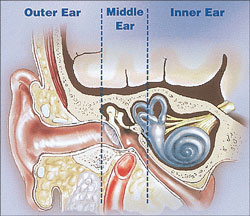Dizziness and Balance
Your balance system helps you to stand, walk, and move around your environment without falling. Balance disorders can cause uncomfortable symptoms, such as dizziness, and can increase your risk of falling. An audiologist can help you learn more about your balance system, balance problems, and treatment options. Audiologists are health care professionals who provide patient-centered care in the prevention, identification, diagnosis, and evidence-based treatment of hearing, balance, and other disorders for people of all ages. Visit ASHA ProFind to locate a professional in your area.
On this page:
About Balance Disorders and Dizziness
Your brain uses the messages it receives from your eyes; your ears (including the inner ear, which contains the vestibular system); and other body parts (e.g., muscles, joints, skin) to help you keep your balance. A balance disorder can negatively impact your life. For example, it can make you more likely to fall. You may also have bothersome symptoms such as dizziness and unsteadiness. Dizziness can refer to a range of symptoms, including lightheadedness and vertigo (a sensation of moving or spinning).
The Ear

Audiologists have specialized training in assessing and treating the auditory and balance systems located in the ear.
The ear can be described in three parts: the outer, middle, and inner ear.
The outer ear is made up of the pinna (the part of your ear you see on the side of your head) and the ear canal. The outer ear helps you determine which direction sound is coming from.
The middle ear starts at your eardrum and includes three tiny bones called ossicles. Sound will cause the eardrum and ossicles to move, sending a signal to the brain.
The inner ear is home to the cochlea and the main parts of the vestibular system. The vestibular system is one of the sensory systems that provides your brain with information about balance, motion, and the location of your head and body in relation to your surroundings. There are three loops in your inner ear, called semicircular canals. The first canal senses up-and-down movement. The second canal senses side-to-side movement. The third canal senses tilting movement. Each canal has hair cells and fluid inside, which move when your head or body moves. The hair cells send messages to your brain through the acoustic nerve. These messages tell your brain about how you are moving. Are you moving straight, like in a car, or up and down, like in an elevator? Or maybe you are not moving at all. This information (along with what you see, hear, and sense with your body) helps you keep your balance. A problem in your inner ear is just one of many factors that can lead to balance difficulties, dizziness, and vertigo.
Signs and Symptoms
Balance disorders come with different symptoms. Symptoms may happen all the time or just occasionally. They may come about suddenly or may be triggered by something (e.g., position change, head movement, visual or sound stimulation). Symptoms of balance problems include
- difficulty walking and moving around;
- dizziness;
- falling;
- headaches;
- lightheadedness;
- motion sickness;
- nausea;
- unsteadiness;
- vertigo (e.g., a feeling that the room is spinning); and
- visual problems (e.g., blurry vision).
A balance problem may cause you to feel nervous or afraid. You may change the way you walk and move around. For example, you may walk more slowly or move your head less.
Causes
It is important to find out the cause of your dizziness and balance problems. A variety of underlying conditions or issues may cause balance problems and dizziness, including
- cardiovascular or circulation problems;
- head injury (traumatic brain injury, or TBI);
- injury to the ear or vestibular system;
- inner ear disorders;
- medication side effects;
- neurological diseases or disorders;
- sudden hearing loss;
- sudden vision changes;
- surgeries, such as cochlear implant placement;
- tumors on the acoustic nerve; and
- viruses and other infections.
Hearing loss and balance problems can co-occur and share an underlying cause, such as an inner ear disorder like Ménière’s disease.
Seeing a Professional
Testing for Balance Disorders and Dizziness
Balance problems and dizziness may be symptoms of a larger health issue. It is important to see a doctor for any concerning symptoms (e.g., blurred vision, sudden hearing loss, falls or problems walking, weakness in the arms and legs). Further balance testing and care can be provided by an audiologist who specializes in balance disorders.
If you are experiencing dizziness or any type of imbalance, an audiologist will first test your hearing and examine your ears. They can provide balance testing to help identify the cause of your balance problems and/or dizziness. Based on this information, they can make recommendations for treatment.
Some balance tests require specialized equipment. You may be asked to wear goggles, sit in a rotating chair, or even complete some tests in the dark.
Treatment for Balance Disorders and Dizziness
Sometimes, balance problems require medical management, such as surgery or medication. You may also benefit from balance treatment called vestibular rehabilitation. Audiologists and other rehabilitation professionals can help improve your balance and reduce dizziness and bothersome symptoms. Vestibular rehabilitation may include exercises with specific movements of the head, eyes, and/or body. Certain types of dizziness may be treated with repositioning procedures. Balance treatment may be provided by an audiologist, a physical therapist, an occupational therapist, or another specialist.
Resources
This list does not include every website on this topic. ASHA does not endorse the information on these sites.









